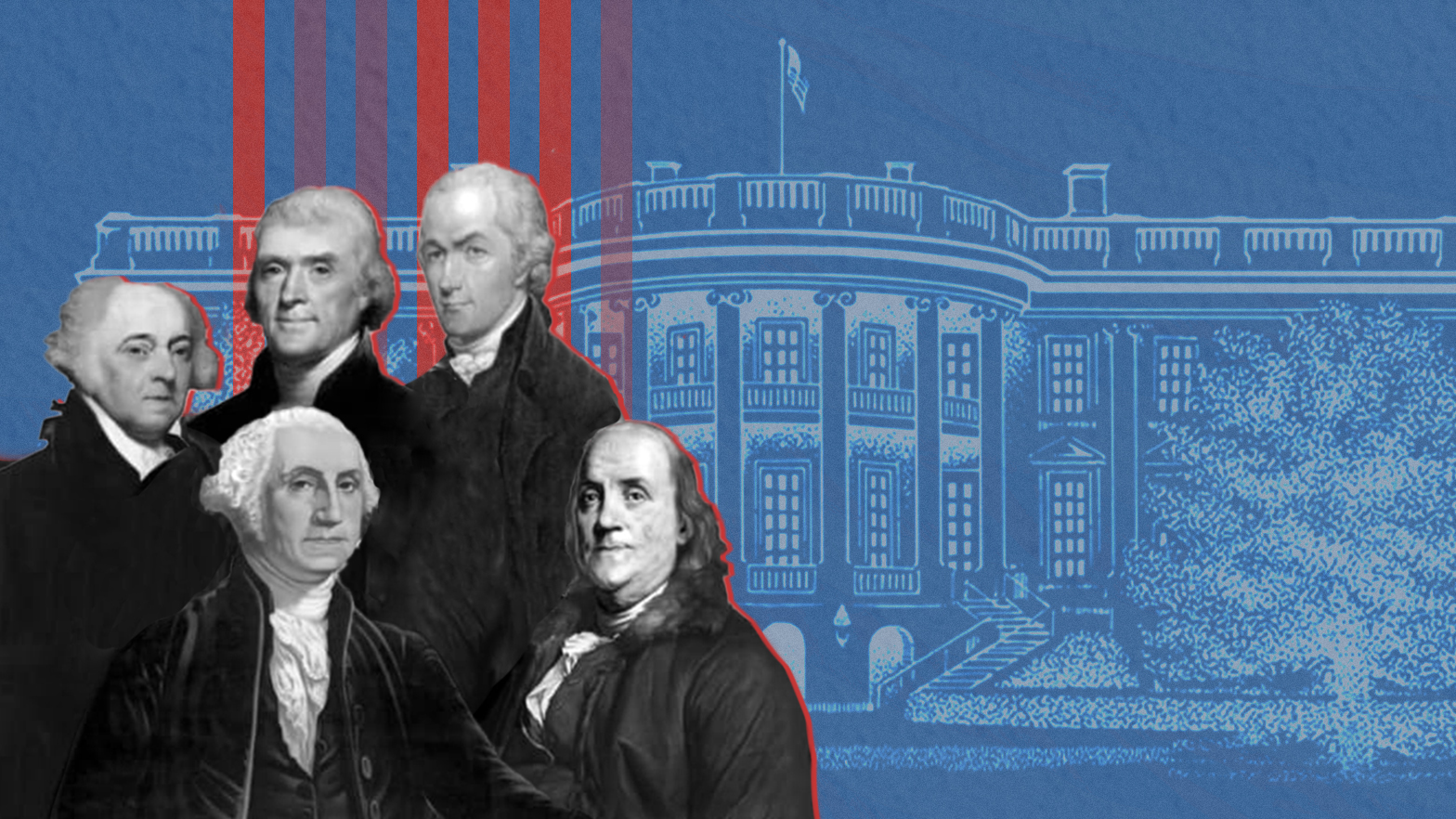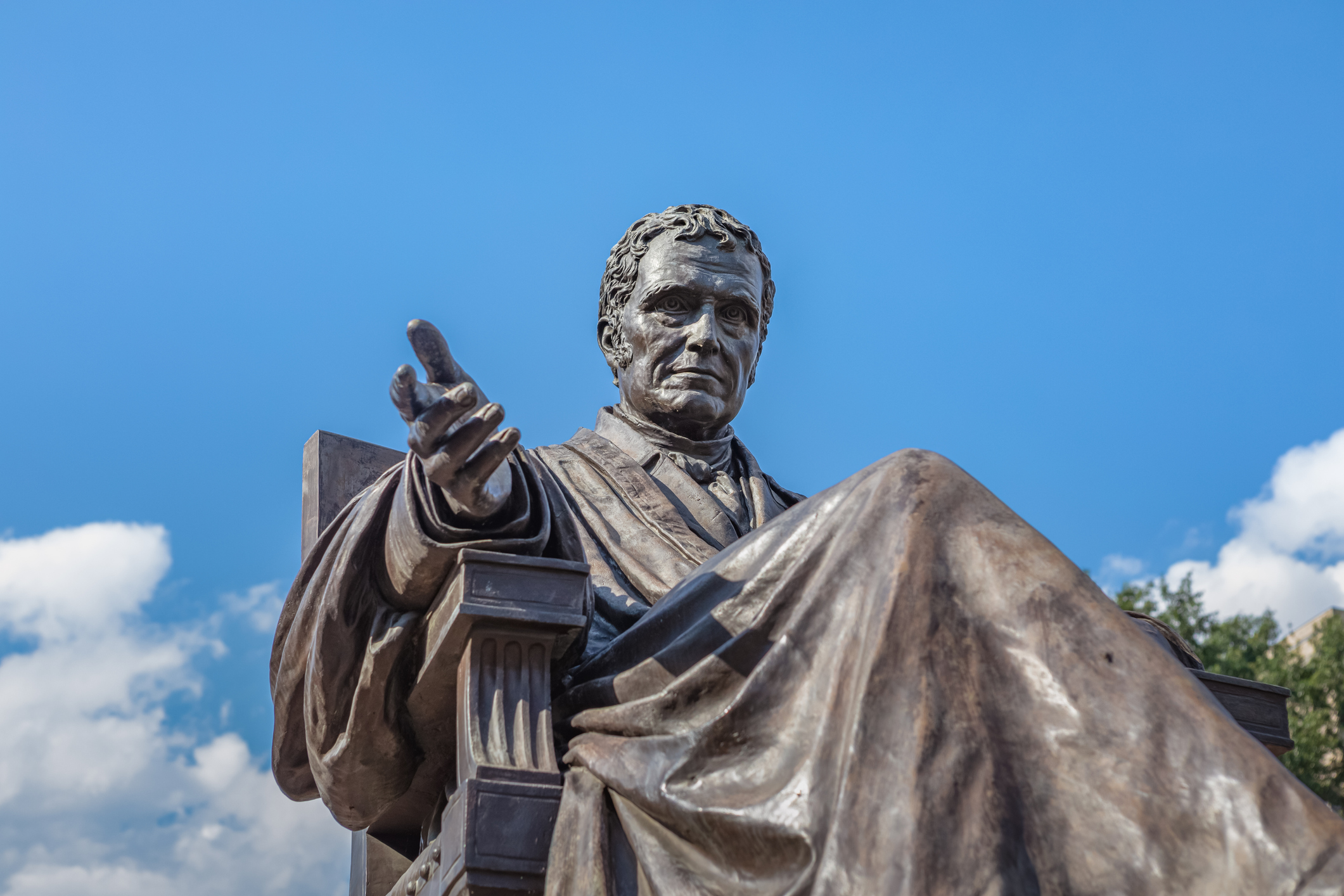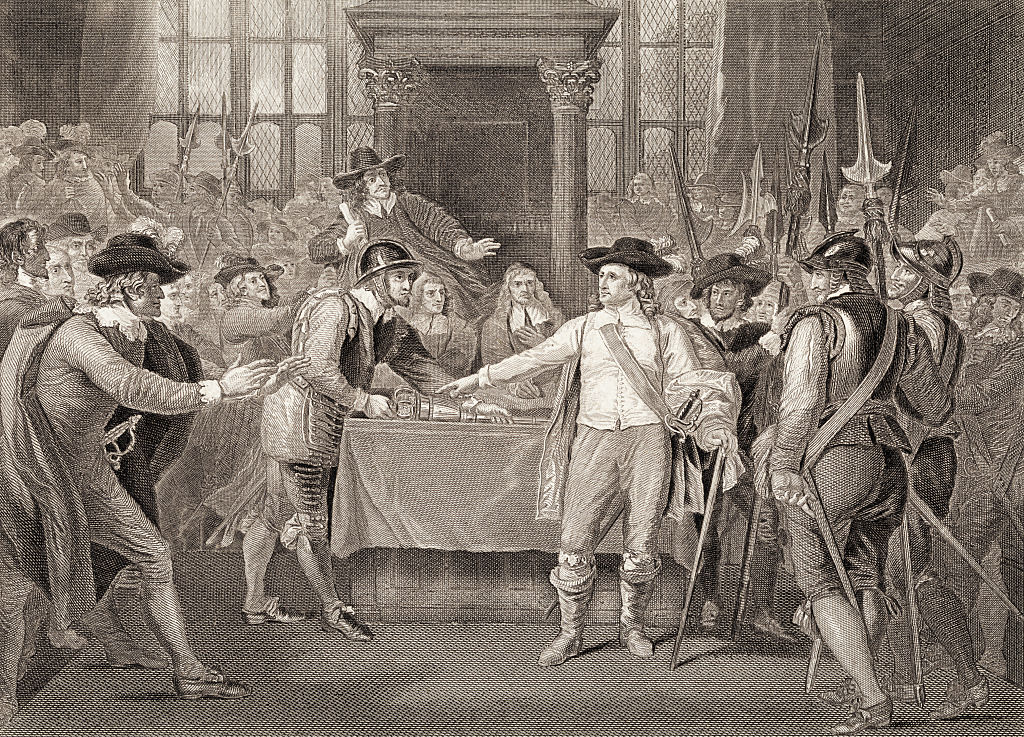But humility, courage, and loyalty might.
American Statesman

Great nations need and deserve great leadership.
The American regime is ill, and everyone feels it. Yet few can agree on the diagnosis and fewer still on the cure. On the Right, some blame the alien germ of European progressivism that captured the imaginations of John Dewey and Woodrow Wilson, others Franklin Roosevelt’s New Deal, Lyndon Johnson’s Great Society, or the Supreme Court’s Engle v. Vitale decision banning school prayer—the list could go on. There’s some truth to all these narratives, but they elide more fundamental realities.
Around the turn of the twentieth century, America became an empire. We annexed Hawaii and the Philippines, acquired control of the Panama Canal Zone, and sent the Great White Fleet of the American Navy around the world. Our industrial base eclipsed Great Britain’s, and we became a great power—and eventually a global hegemon—as America emerged victorious from two world wars. The benefits of this triumph are manifest and helped to create the most prosperous middle class on earth.
But it’s difficult for a democratic republic based on the principle of separation of powers to sustain a global empire abroad without revolutionizing its constitutional structure at home. Moreover, against the backdrop of the Great Depression, Americans began to want things from their burgeoning imperial government that the Founders’ Constitution had forbidden. In response, Franklin Roosevelt’s New Deal vastly expanded the scope of executive power and created a patchwork of federal agencies to circumvent the separation of powers and deliver relief for the American people.
Roosevelt himself delighted in his newfound authority and trolled his critics by dressing up as Caesar for his 52nd birthday party at the White House in 1934. America had followed the path of many other great powers and transitioned from republic to empire. The Constitution had not been formally amended, but the nature of the government had been transformed. This has been the status quo for nearly a century, more than a third of American history.
Today’s administrative state is the result of the haphazard creation and multiplication of federal agencies over the decades. Congress knows that the Constitution doesn’t allow for such delegation of authority, but they delegate it anyway to meet the demands of constituents—who clamor for government relief in emergencies—and corporate donors whose industries want to capture government regulations and contracts. The checks and balances secured by the separation of powers are overcome in the most inefficient, duplicative, and bureaucratic manner possible because it’s easier to create new federal agencies and throw money at them than it is to either defund an existing agency or to amend the Constitution.
Whatever support Social Security and Medicare provide to the middle class, the principal beneficiaries of the regime are the wealthy and well-connected. The administrative state today does less to aid a president in office as it permanently supports the ideology, power, and material flourishing of a new American oligarchy.
This oligarchic class exists within a variety of elite sectors including the corporate media, finance, academia, big philanthropy, think tanks, technology companies, and defense contractors, among others, that have integrated into the fabric of the regime. Members of this group move between positions in government, business, and philanthropy, using the full power of the imperium to advance their interests and implement their ideological agenda.
The path to returning our nation to the system of government established in 1789 is arduous. The cancer in the regime has metastasized to such a degree that attempting to destroy it could kill the patient—not merely the federal government, but the entire network of economic, cultural, and security actors that live off it, yet sustain our modern American way of life, for now.
This reality brings us to an impasse. America’s Cold Civil War is between one side who has near complete control of the imperium and another that has just enough power to win occasionally at the ballot box or to have the Supreme Court overturn a precedent—only to face defeat in the states anyway. Under such circumstances, how do we save the regime in a peaceful and democratic manner without destroying it in the process?
Rediscovering Mirrors-for-Princes
One possible cure lies in a forgotten genre of literature called “mirrors-for-princes” that existed among all cultures, creeds, and civilizations. It offered practical and moral advice for rising statesmen who had to deal with the age-old problem of oligarchy. These texts functioned like self-help manuals for embattled leaders fighting corrupt aristocratic classes. The genre represents the political wisdom of mankind, and it has helped inspire and instill courage, prudence, and charisma in countless leaders who have heeded its counsels.
Some of its most famous authors include Xenophon, Cicero, Han Fei, Al-Farabi, Thomas Aquinas, Christine de Pizan, Machiavelli, Erasmus, and Thomas More. While not every piece of advice in the tradition is worth following—some of it is quite diabolical—overall, it’s a testament to the fact that previous generations paid serious attention to the qualities that they wanted to cultivate in political leaders and the education required to do so.
While there are countless lessons to be gleaned from this tradition, there are four fundamental insights that can help us to imagine a way out of the crisis America faces in 2024:
We must reclaim a politics of transcendence. The ancient world believed that political leaders served as a link between heaven and earth. While our conception of political rule in the modern West differs greatly from antiquity’s, human beings still long for leaders who point them toward ultimate ends. Successful leaders from history often rose above dueling factions of aristocrats and defended the interests of the common people against the abuse of elites, while elevating their hopes toward more permanent realities than politics.
We must champion a vision of the common good that promotes the flourishing of the whole body politic. Great leaders don’t focus primarily on punishing enemies, instead, they reward friends. This should not be confused with special favors for insiders. Rather, the political friendship on offer is an open invitation to people of goodwill regardless of partisan affiliation who share a vision of the common good. Subsidiarity teaches us that the common good will look different in each community, but everywhere its goal is to foster the conditions that allow everyday people to live virtuously in a regime that maintains justice, order, peace, and broad-based prosperity.
We must take aesthetics seriously. People are not often persuaded by logic. Rather, they are enchanted by beauty. Rational arguments follow later as a means of supporting their views and validating decisions. It’s an epic tale, drama, and romance that capture people’s imaginations and move them to follow a leader. Leadership requires painting a beautiful portrait of the world you’d like to inhabit and instilling confidence that you are the best person to make it a reality. In an age where truth and goodness have lost their potency, beauty, as wiser minds have noted, could save the world.
Finally, we need individuals to emerge who have the character and competence to achieve these ends. Because we are a “government of laws and not of men,” as John Adams noted, most Americans feel uncomfortable embracing a “great man” or “great woman” theory of history. While preserving healthy laws and institutions is vital for the flourishing of any regime, it’s not sufficient. A politics of transcendence, the common good, and beauty can only hold together in individuals who not only represent but also embody the people, nation, history, and ideals that they serve.
Throughout modern history, leaders like Theodore Roosevelt, Winston Churchill, and Charles De Gaulle, who exhibited these core insights, have arisen in times of crisis with a call to greatness, risen above warring factions, and established new political settlements that shaped their regimes for a generation.
These great leaders understood the politics of transcendence and the common good to such an iconic degree that their images, words, and deeds eventually came to define the West itself. As we approach another presidential election in 2024, it’s incumbent upon us to sketch an image of what it would look like to do what T.R., Churchill, and De Gaulle did in their own times. To draw from the wisdom of the mirrors-for-princes genre and imagine an ideal statesman who can hold together the hopes of the people, rise above partisanship and oligarchy, and renew the American regime.
Toward a Politics of Transcendence
The watchwords of the statesman will be happiness, independence, and greatness. Happiness speaks to our human desire for faith, family, community, and dignified work. Independence signals our emancipation from personal and national debt, a revitalized industrial base, and a prosperous middle class. Greatness speaks to the human need for transcendence and harkens to the heroism of Washington crossing the Delaware, the building of the transcontinental railroad, GI’s storming the beaches of Normandy on D-Day, NASA sending a man to the moon—and forward to the hope of leaving our children a better nation than the one we inhabit now.
Excellence in Education: Parents want to send their kids to schools that have high and objective standards, equip them with knowledge to be good citizens and community members, prepare them for a respectable career, and eschew radical ideologies.
Peace through Strength: Americans want to feel safe from threats both foreign and domestic. They want to have the strongest military in the world for their protection but use it in a prudent and realistic way.
Public Safety: Americans want to live without fear of crime when they leave their homes. They want justice to be impartially enforced and order restored to our cities.
Prosperity for All: Americans want their kids to be better off financially than they were growing up. They want prosperity to be widely shared, economic growth and innovation, wages that rise with company profits, and an end to rampant inflation.
Dignity in Work: Americans are an industrious and entrepreneurial people by nature. They want to have safe and meaningful jobs that complement their unique talents and abilities while allowing enough flexibility to spend time with family and friends.
Beauty in the Environment: Beginning with public buildings and outdoor spaces, the beautification and conservation of America must be a national priority. So much of modern life is ugly and utilitarian. Americans long for public architecture that inspires and nature to explore.
Transparency in Healthcare: Healthcare is exorbitantly expensive and bureaucratic. Americans want affordable healthcare, clarity on costs, and a personal relationship with their doctors.
Kindness in Culture: Americans want to live in a society where everyone is treated with respect. An appreciation of variety and healthy respect for human freedom doesn’t preclude shared moral norms or imply that the views of a minority must be imposed on society. Rather, Americans want a culture of dignity for all citizens.
Justice for the Lawless: There are two standards of justice in our system. Elites plunder with impunity, yet never face any consequences, and violent criminals are allowed to wreak havoc on innocent civilians and businesses. Meanwhile, ordinary people bear the brunt of the justice system and suffer under an endless number of confusing laws and regulations. The rule of law must be restored in America.
Character and Competence in Office: The American government is run by a senile gerontocracy that maintains the status quo while enriching their cronies in the new American oligarchy. The quality of our political leaders is a national scandal; it’s an embarrassment to our allies and encouragement to our enemies throughout the world. Americans need leaders who command the basic respect and trust of the people.
Health of Body: American life expectancies are on the decline. We lag all the developed world on outcomes in healthcare. Americans need to get healthy again and feel confident in their bodies.
Security of Borders: It’s impossible to have a nation without borders. There is currently a humanitarian catastrophe along the southern border due to non-enforcement of our immigration laws. Americans want to restore an orderly and secure system of immigration that serves our cultural and economic interests.
Wholeness in Society: Americans crave real community, but friendship, family, and romance are difficult to find. Addiction to alcohol, gambling, drugs, and pornography are rampant, but we don’t have the tools to establish our freedom and independence. We need to restore a sense of wholeness and wholesomeness to American life to foster pride in ourselves and our nation.
By painting a sweeping vision of happiness, independence, and greatness—and captivating people with transcendent themes that impact their daily lives—the statesman will speak to a strong majority of Americans who want the same fundamental things for their families and their country.
Combined with the right aesthetics and ground game, victory at the ballot box is achievable. The real challenge is what comes next.
Blueprint for Victory
At the inauguration, the next American statesman must ask Congress for legislation to resolve four immediate, existential threats facing the nation today:
- Crime
- Inflation
- Open Borders
- Ending the War in Ukraine
America has numerous problems, but these stand out as the most urgent because they touch on the basic needs of human beings for protection, shelter and sustenance, security, and peace. Without these foundations, it’s impossible to address more complex policy issues. In the first 100 days of his or her presidency, meaningful progress must be made in these core areas. The result will be an immediate improvement in people’s lives based on tangible actions taken by the nation’s chief executive. After winning the confidence of the people in small, yet important matters of concern, the statesman can now turn Congress’ attention to the two great structural challenges facing the country: education and defense.
The immense amount of money that the federal government spends on education and defense contractors are like mighty rivers. Its currents are so powerful that damming the rivers would be like trying to turn the faucet off at Niagara Falls. Success requires making some counter-intuitive moves from the perspective of contemporary movement conservatism. Instead of merely trying—and failing—to dismantle the federal government all-together, the realistic goal should be to reroute the rivers so that they flow to more fertile and productive soils.
The education system must be transformed to make it more excellent, accessible, and localized. Our current, college-for-all model is bankrupting the nation and not preparing young people morally or professionally for flourishing lives. Trade schools and apprenticeship programs (for blue-collar and white-collar jobs alike) should be made widely available to high school students so that they can graduate with practical skills and good-paying jobs—while avoiding tens or hundreds of thousands of dollars of debt. Bloated educational bureaucracies must be put on a strict diet. Money should follow students, not failing systems.
The federal department of education—and funding for student loans—must be abolished, and the savings reallocated to providing funding for trade schools and apprenticeship programs across the country. A new tax on university endowments over $2 billion would be used to forgive student loans for new public service workers like teachers, police officers, and fire-fighters who serve more than five years, attracting top talent to these vital professions.
Americans have been complaining about the military-industrial complex since President Eisenhower’s prophetic farewell address in 1961, but the situation has only gotten more dire. The industry has consolidated into the hands of a few monopolies, and it is increasingly corrupt, inefficient, and inadequate to address twenty-first century security concerns.
Apart from instituting a ten-year ban on lobbying after service in the federal government, we should acknowledge the system for what it is and use it to serve our national interests. The military-industrial complex—and leading technology companies—should be put to the task of rebuilding America’s defense industrial base, infrastructure, energy, and conservation needs. From space rockets and nuclear energy to public parks, preserves, museums, libraries, and high-speed rail, the task of making America secure, dynamic, and beautiful will inspire national pride in a new generation.
The Path Forward
Decline is not inevitable. We may never fully return to the glory days of the American Founding in terms of governance or to the industrial capacity and military hegemony of the post-World War II era, but we can make America the greatest cultural, political, and technological force of the twenty-first century.
The path forward requires an honest assessment of American empire and indictment of its oligarchy; a rediscovery and application of the wisdom from the mirrors-for-princes tradition on statesmanship; leaders who rise to the challenge in moments of crisis; and most importantly, the imagination to conceive of a new paradigm for politics that transcends the status quo and secures the common good for all Americans.
The American Mind presents a range of perspectives. Views are writers’ own and do not necessarily represent those of The Claremont Institute.
The American Mind is a publication of the Claremont Institute, a non-profit 501(c)(3) organization, dedicated to restoring the principles of the American Founding to their rightful, preeminent authority in our national life. Interested in supporting our work? Gifts to the Claremont Institute are tax-deductible.
At what point does the Revolution swallow itself?
Integralists target the American constitutional order.
A reply to Matthew Continetti's recent critique.
America is neither unreservedly an empire nor altogether a European-style state.
Only by resisting the invasion of the spiritual kingdom by the temporal can digital despotism be condemned.






